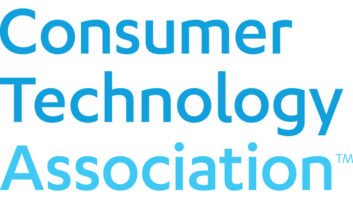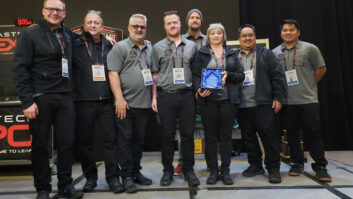Las Vegas — As is now tradition, the Consumer Electronics Association’s (CEA) president Gary Shapiro officially opened the 2006 International CES at yesterday morning’s keynote session by welcoming attendees in a presentation during which he also offered a quick preview of the show, cited the association’s 2005 accomplishments and outlined some principles for the industry to follow over the next few years.
Like the industry itself, Shapiro said CES keeps getting bigger. At a record 1.6 million square feet of exhibit area, CES is so large that if laid out flat, it could be used to stage 700 full-court basketball games “all at the same time.” Demand “continues to outpace available space,” and CES now has exhibits housed at the Sands Convention Center, “a short shuttle bus ride from the Las Vegas Convention Center.”
Last year, he opined, will be known “as the tipping point for digital TV,” during which consumers purchased an estimated 12 million sets, nearly double the digital TV sales of all past years combined. With the anticipated 2009 cutoff for analog broadcasts looming, sales will continue to grow. This year, he noted, with all the new advanced audio, video and communications products on view, “CES stands as the center of the digital universe.”
Looking back on 2005, Shapiro said CEA continued to work for consumers’ fair-use rights, helped develop DTV legislation and increased its political action committee activity. In addition it continued its education programs for consumers, manufacturers and installers, and sales training for retailers. It also won its first-ever Emmy for work to standardize closed captioning, was a partner in creating SINOCES, an industry trade show in China, and “launched the Digital Patriot Award” to honor those who “defend and promote technology innovation.” The first award will be presented in Washington on March 15 to Microsoft’s Bill Gates.
Certain principles should be followed if the industry is to enjoy continued and successful growth over the near- to short-term, Shapiro said. They include preserving and protecting the environment by improving communication technologies that reduce the need for travel, supporting product energy efficiency and developing a national energy standard, working to expand free worldwide trade, completing legislation to shift TV broadcasting from analog to digital, joint efforts by manufacturers and content providers to protect program rights without harming fair-use rights or restricting new technologies, and working with automakers and broadband providers to create standard product interfaces for the car and easier access to in-home broadband services.
This is a period “of accelerating change, phenomenal promise and tough choices,” for the industry, Shapiro said. “I ask you to consider how our actions today will define the future for generations to come and to do the right thing by joining with us on this quest for a better world.”
As the start of his presentation, Shapiro introduced Senator John Ensign (R-Nev.) whose remarks included a pitch for his state’s support of high-tech business and a request for more industry input on related legislation. Such input, he said, should tell Congress “what to do and what not to do” to avoid “unintentional consequences” that might end up actually hindering the introduction of new products and technologies.













